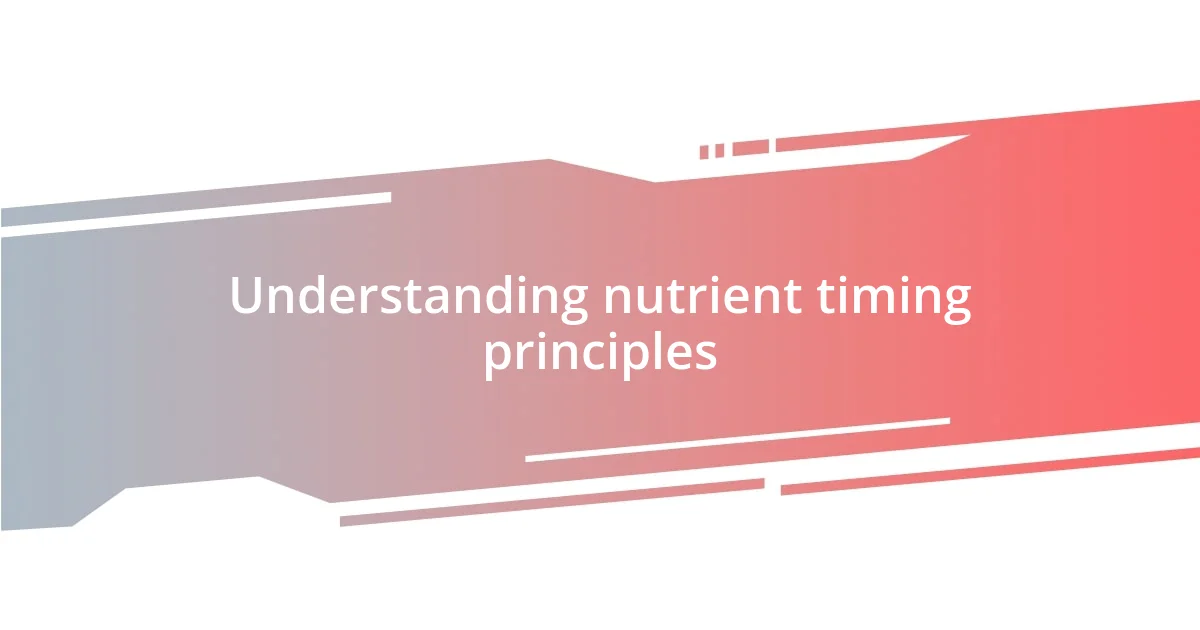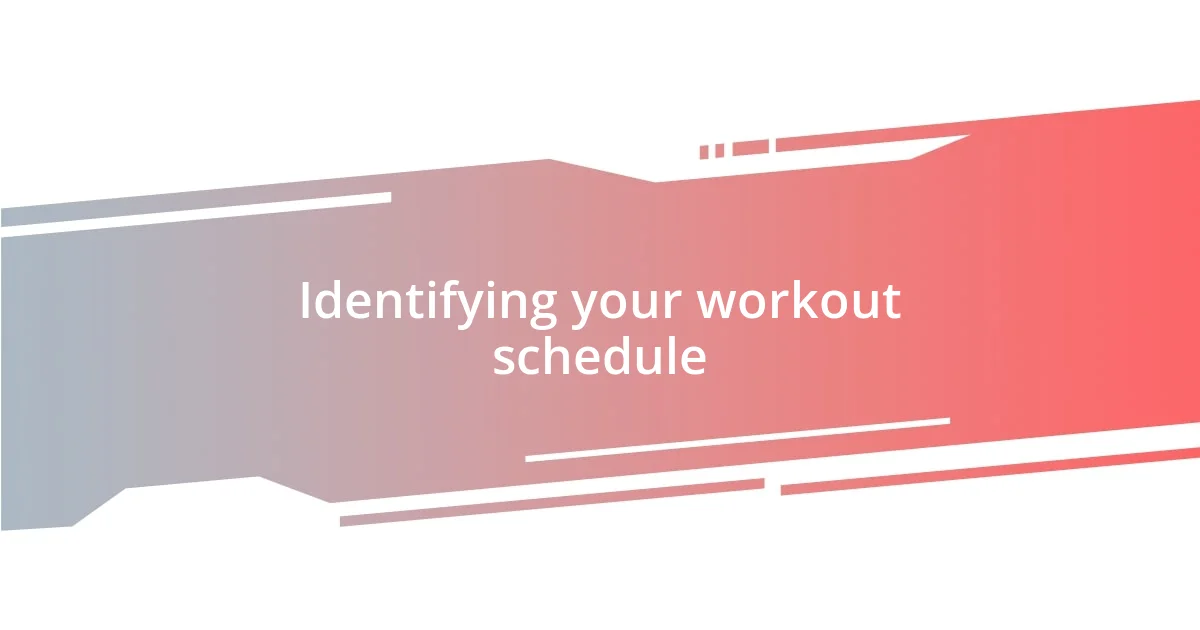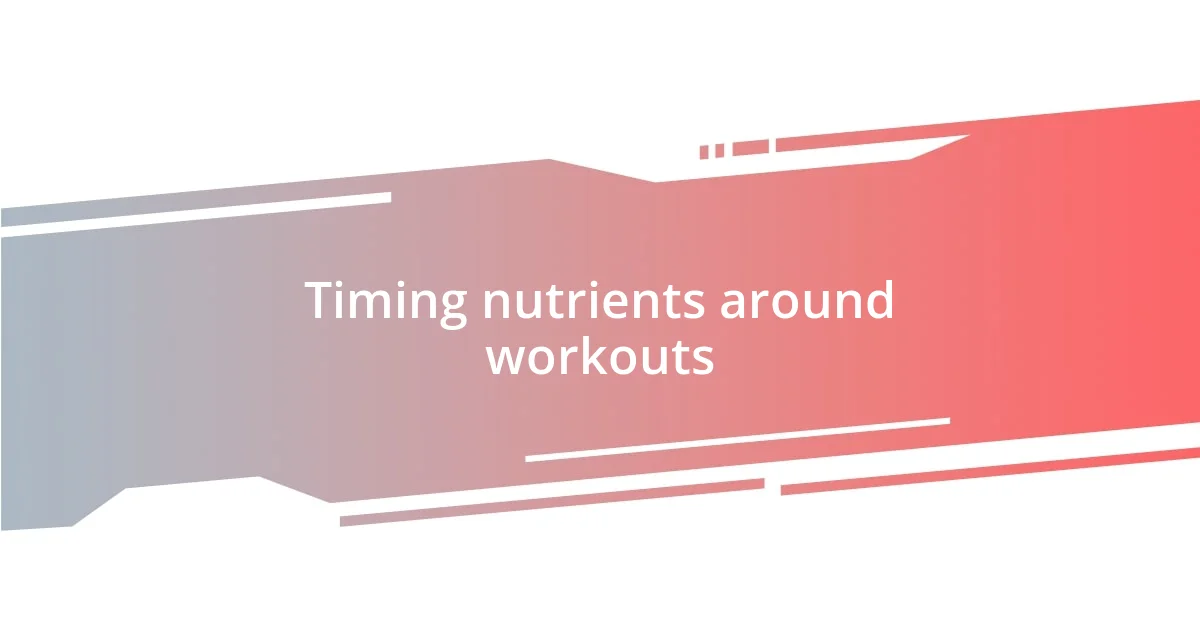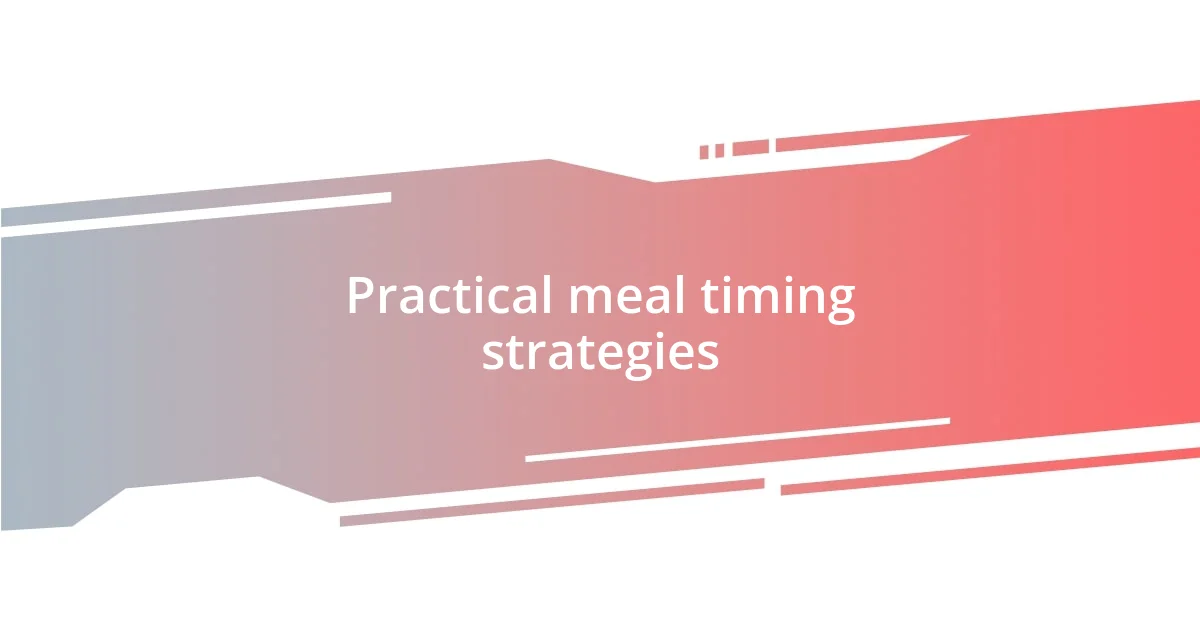Key takeaways:
- Nutrient timing plays a crucial role in enhancing physical performance, recovery, and mental clarity by strategically scheduling meals around workouts.
- Identifying your workout schedule helps in tailoring meal timing and types, leading to improved energy levels and better workout outcomes.
- Monitoring the effects of meal timing and making adjustments based on personal experiences can significantly optimize overall well-being and performance.

Understanding nutrient timing principles
Nutrient timing is all about delivering the right nutrients to your body when it needs them most. I remember experimenting with my pre-workout meals; I found that having a small carb-rich snack about an hour before exercising significantly boosted my energy levels. It made me curious—how could something as simple as timing change my performance so dramatically?
One of the key principles revolves around protein intake. For example, I always ensure I consume protein shortly after my workouts. This practice not only helps in muscle recovery but also enhances my overall performance in subsequent workouts. Have you ever noticed how your body responds to different nutrient timings? It’s fascinating to observe and adapt based on what feels right for you.
The practice of nutrient timing goes beyond just pre and post-workout meals; it also involves daily routines. I’ve learned that evenly spacing my meals throughout the day helps maintain steady energy levels. It’s empowering to realize that small shifts in when I eat can profoundly impact my training outcomes and daily energy. Isn’t it amazing how something so elemental—eating—can be optimized with a bit of planning?

Benefits of precise nutrient timing
Precise nutrient timing offers remarkable benefits that can enhance overall performance and recovery. For instance, I’ve seen firsthand how a carefully timed post-workout meal accelerates muscle repair. After a grueling gym session, that immediate intake of protein and carbs feels like a recharge button for my body. It’s almost like giving my muscles a thank-you gift for the hard work they just put in!
Additionally, maintaining optimal energy throughout the day is another advantage of nutrient timing. I often recall my busy days when I neglected meal timing; it left me feeling drained and unfocused. Now, by scheduling meals and snacks at strategic intervals, I find that I can power through my tasks more efficiently. It’s a simple change that makes a world of difference—why not give it a try yourself?
Moreover, nutrient timing not only enhances physical performance but boosts mental clarity too. I once experimented with this concept during a week of heavy study for exams. Aligning my meals around study sessions provided me with sharper concentration and stamina. Have you ever noticed how your focus wavers when you’re hungry? The right timing can fuel both body and mind, helping you achieve your goals with greater ease.
| Benefit | Personal Experience |
|---|---|
| Enhanced Muscle Recovery | A quick post-workout meal has significantly improved my recovery time. |
| Steady Energy Levels | Strategic meal timing keeps my energy stable throughout busy days. |
| Mental Clarity | Timing my meals during study sessions sharpened my focus and stamina. |

Identifying your workout schedule
Identifying your workout schedule is crucial for optimizing nutrient timing. I’ve discovered that knowing when I plan to exercise allows me to tailor my meals better. For example, on days when I hit the gym early, I prioritize a wholesome breakfast packed with carbs and protein to fuel my session, which leaves me feeling strong and energized. If I’ve planned an evening workout instead, a lighter but nutritious lunch helps me avoid that sluggish feeling but keeps my energy steady.
Here’s how I recommend identifying your workout schedule effectively:
- Reflect on Your Routine: Determine the times you consistently feel most energetic for workouts.
- Consider Your Goals: Are you training for strength, endurance, or overall health? This can influence timing.
- Experiment with Timing: Try different timings for meals and snacks based on your workout; observe how your body reacts.
- Write it Down: Keep a log of your workouts and meal times to find a pattern that works best for you.
- Adjust as Needed: Your schedule might change—don’t hesitate to tweak your nutrient timing to keep up with your lifestyle.
Each of these steps can lead you toward a more personalized approach to fueling your body. In my own journey, charting my workout times has not only helped in fine-tuning my nutrition but has also instilled a sense of control and awareness about how my body operates. It’s reassuring to see the positive impacts as I adapt my meals around my workouts, and I encourage you to explore this for yourself!

Timing nutrients around workouts
The timing of nutrient intake around workouts can significantly shape your performance. I vividly recall a moment when I switched my pre-workout snack from a quick banana to a more balanced option, incorporating protein and complex carbs. The difference was night and day. Instead of feeling jittery and unfocused, I experienced sustained energy that powered me through the final sets of my workout. Have you ever considered how a simple snack could transform your training experience?
It’s also essential to recognize the timing after your workout. I’ve made it a habit to prepare a smoothie immediately post-exercise, packed with protein and healthy fats. This little ritual not only satisfies my hunger but also accelerates my recovery. I remember a time when I neglected this step and felt the consequences; my muscles were painful the next day, reminding me that what you eat after working out can be just as crucial as what you eat before.
Furthermore, I often find that listening to my body is key. I’ve learned to adjust my meals and snacks based on how I feel and the nature of my workouts. On days when I anticipate a grueling session, I opt for a larger meal a couple of hours before. Conversely, lighter snacks work better on less intense days. This flexibility has taught me a valuable lesson: nurturing my body isn’t just about strict rules—it’s about understanding its unique rhythms and needs. Have you tapped into your body’s signals to find that sweet spot for nutrient timing? Discovering this can make all the difference!

Choosing the right foods
When it comes to choosing the right foods, I think about the quality and quantity of what I consume. For instance, I’ve learned that not all carbs are created equal. Instead of reaching for refined options, I now opt for whole grains like quinoa or brown rice, which provide me with steady energy throughout my workouts. Have you ever noticed how the body responds differently to various food sources? It’s fascinating!
I also pay close attention to incorporating healthy fats into my meals. I’ve experienced days where I skimped on these essential nutrients, and I definitely felt the impact—my energy dipped, and my recovery took longer. By adding avocados or nuts to my dishes, I not only enhance flavor but also support my body’s recovery process. Have you ever tried experimenting with different types of oils or nuts in your meals? You might be surprised at the difference it can make.
What really resonates with me is the importance of meal timing as a part of the larger picture. I recall a time when I rushed through lunch and paid the price during my workout later. Feeling lightheaded and unfocused was a clear sign that I hadn’t fueled my body appropriately. Now, I make it a point to plan balanced meals ahead of time, ensuring I’m satisfied without feeling heavy. What strategies do you use to prepare for your workouts? Finding what works best for you can be a game changer!

Practical meal timing strategies
One strategy I’ve found invaluable is to establish a consistent meal schedule. I remember the early days of my fitness journey when I’d eat whenever I felt hungry, leading to unpredictable energy levels. Once I began structuring my meals around specific times, everything changed. Suddenly, my workouts felt more efficient, as I was fueling my body precisely when it needed it. Have you tried setting regular meal times?
Another approach I’ve embraced is the concept of “prepping” meals in advance. I often spend a couple of hours on weekends preparing snacks and meals for the week. One time, I made a batch of nutrient-dense energy balls that saved me from unhealthy snacking during a busy work week. The convenience of ready-to-eat options not only reduces stress but also ensures I’m not caught off guard by cravings. What do you think would happen if you planned your meals ahead of time?
Lastly, I’ve learned to incorporate intuitive eating into my meal timing strategies. Some days, my body craves a hearty breakfast, while others call for a more minimalist approach. I remember feeling a twinge of guilt the first time I allowed myself to skip breakfast when I wasn’t hungry—I thought I’d sabotage my progress. In reality, I discovered that honoring my hunger cues leads to better overall satisfaction and performance. How often do you tune in to what your body really wants?

Monitoring results and adjustments
Monitoring the impact of my nutrient-timing strategy has been a game changer. In the beginning, I kept a simple food diary, noting how different meals affected my energy levels and workout performance. I vividly recall a week when I experimented with timing my carbs strategically—my energy soars during my workouts, and I felt unstoppable! Have you ever tracked your food intake like that? It can really help in understanding your body’s unique responses.
Adjustments are just as crucial as monitoring. After noticing that I felt sluggish during evening workouts, I shifted my pre-workout snack to include a bit more protein. The difference was striking; I was more focused and energetic. It made me realize how little changes can lead to significant improvements. Have you taken the time to tweak your meals based on what you feel? It’s all part of the journey.
I also pay attention to how my mood correlates with my nutrient timing. One day, I noticed I felt fairly irritable after a poorly timed lunch. It was a lightbulb moment—I recognized how crucial good nutrition is not just for physical health but for emotional well-being as well. Do you find that what you eat impacts your mood? For me, it’s another reminder to stay mindful of my food choices and their timing.















